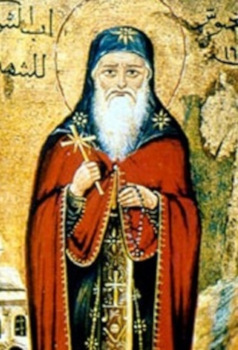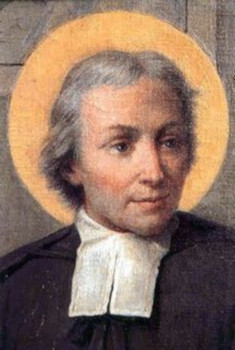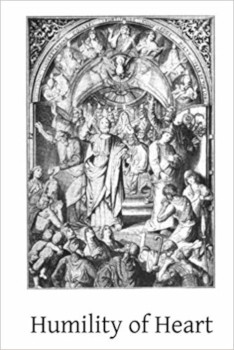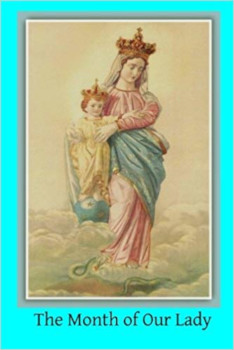May 2019: Olive Tree

Volume II/Issue 37/May 2019


From The Editorial Desk
The Blessing of Being A Mother
Adam called his wife 'Eve', because she was a mother. In the pure light of God's presence, in Eden, he knew clearly what his wife's ministry was. Eve knew it as well. Sin and human traditions (influenced by Satan) have now, however, clouded women's understanding, so that she no longer sees her glory as a mother. Children are now called by the Satanic name of 'accidents', when God calls them 'gifts' (Psalms 127:3). They are also considered to be a 'nuisance', when God considers them to be a 'blessing' (Psalms 127:5; 128:4). This is but another indication of how far even so-called Christians have drifted away from God and become Satanic in their thinking!
Saint Timothy's mother, Eunice, however, was quite different. She had seen her calling clearly. Even though her husband was an unbeliever (Acts 16:1), it did not dampen her faith. She was a woman with a 'sincere faith' (2 Timothy 1:5) and who knew the Word of God. She taught God's Word to Timothy (2 Timothy 3:14,15); and more than that - she imparted her catholic faith to him as well. Timothy's home was one where his mother enabled him to breathe the pure air of 'faith' in the midst of a world full of the poisonous fumes of unbelief. He probably saw his mother frequently in prayer, frequently praising God, trusting God in difficult situations and never nagging or complaining - for these are but some of the characteristics of a 'sincere faith'. It is not surprising then that Timothy grew up to be an apostle and a close co-worker of the apostle Paul. His mother's labors finally bore fruit.
That should be a challenge to all 20th century mothers. Eunice, Timothy's mother, did more for the Lord and the church by being a first class mother at home for 16 to 20 years than she could ever have done if she had travelled the world as a preacher for 100 years!
In talking about the ministries of men and women, Paul tells Timothy that although women cannot “Suffer a woman to teach, nor to use authority over the man,” they can have the ministry of motherhood (1 Timothy 2:12,15). In the context of the letter, it is obvious that Paul considers motherhood to be a ministry in the church. This is a ministry that God calls women to - to be a God-fearing mother to her children. Timothy had seen the glory of this in his own childhood home. He was now to teach that to others in Ephesus.
Men sometimes excel women in many professions in life. But in one area alone do women stand out as unique - as 'mothers'. This, by itself, indicates what God created a woman to be. Mothers who have neglected their children either to go to work to earn more money (to live in greater luxury) or even have invariably had the sad experience, later on in life, of seeing their children suffer in one way or another, due to their being neglected in their early years. They can do nothing but regret now. This should be a warning to the younger generation of mothers. If a mother goes to work, for the sake of her family's financial survival, God will certainly give such a family extra grace. But where the motive is luxury and a higher standard of living, she can only expect to reap corruption, for God cannot be fooled (Galatians 6:7-8).
May the eyes of all mothers be opened to see the glory of their calling!

Conversion
When we think of conversion, we think of someone coming into the true Church of Jesus Christ, the Catholic Church. However, there is what spiritual authors often call the second conversion. This is when we get serious about living the Catholic way of life. For those of us baptized in our infancy, there comes a time, when we must take the Catholic way of life seriously. If we do not, then we will become worse than the pagans surrounding us. We will be worse than the Pharisees, whom Jesus called whited sepulchers. (Matthew 23:27) In fact, we can become proud of our apparent Catholicism, which consists of external practices only rather than in a heart that is ready and willing to serve God and do whatever He may ask of us.
Father Ralph Pfau, the first priest in AA writes: “In the middle ages this change was called a conversio mores which literally meant a complete change of customs and habits.” This conversion requires us to move from a lax life of self-indulgence to a life of sincere service of Almighty God. How many of us are half-hearted at best in the spiritual life?
The Holy Ghost says: “I know thy works, that thou art neither cold, nor hot. I would thou wert cold, or hot. But because thou art lukewarm, and neither cold, nor hot, I will begin to vomit thee out of my mouth.” (Apocalypse 3:15-16) Rather strong words, but words we need to take to heart. Lukewarmness comes on most of us imperceptibly. We find that we have slacked off from our spiritual life into a life of lukewarm self-indulgence.
Let us look seriously at our life and see where we truly are. Let us not deceive ourselves, but be brutally honest and come before God. “Dear Lord, I find that I am not where you would have me be. Bring me home, no matter what it may cost me. I am ready and willing for you to change my heart into what it should be. Change me, dear Lord.”
Soon we will begin our meditations on the Passion in Holy Week. We will read all of the events of our salvation. Jesus was not half-hearted, but desires to give His all for our salvation. How do we return this selflessness? Are we selfish or selfless. As we consider what all Jesus suffered, let us ask ourselves, what am I willing to suffer for Jesus and for my neighbor?
Saint Ignatius of Loyola said: “Of a hundred persons devoted to prayer, more than ninety are self-willed.” Let us consider this well. We may have a prayer life, but if we are still selfish and self-willed, we are not where we should be. Saint Alphonsus says: “All bad passions spring from self-love.” Self-love leads to selfishness and being self-willed. Basically these are all fingers on the same selfish hand.
Louis of Granada writes in his work, The Sinner's Guide: “St. Thomas gives us a profound reason for this. All sin, he says, proceeds from self-love, for we never commit sin without coveting some gratification for self. From self-love spring those three branches of sin mentioned by St. John: “The concupiscence of the flesh, the concupiscence of the eyes, and the pride of life” (I John 2:16), which are love of pleasure, love of riches, and love of honors. Three of the deadly sins, lust, gluttony, and sloth, spring from love of pleasure, pride springs from love of honors, and covetousness from love of riches. The remaining two, anger and envy, serve all these unlawful loves. Anger is aroused by any obstacle which prevents us from attaining what we desire, and envy is excited when we behold anyone possessing what our self-love claims.”
When we truly convert, we must put away our life of sin, especially our pet sins. We must stop making excuses and ask God to purify us completely. Jesus prayed in the garden: “Father, if thou wilt, remove this chalice from me: but yet not my will, but thine be done.” (Luke 22:42) Let us make this prayer our way of life.

What Are You Hungry For?
I was reading an article recently where the heart of the article focused on the following premise: what people are searching for and what they are getting (or not getting, as the case may be) when searching for churches. The one quotation that caught my attention was "I'm just not getting fed." It's funny to think about the fact that if you have not had anything to eat for a while, your mind starts to dwell on that fact and nothing else. We focus on everything that we might want to eat: pizza . . . Chinese food . . . spaghetti . . . Mexican . . . . fast food . . . fried chicken . . . a sandwich . . . And we finally make the decision as to what exactly we want and once we do . . . that's it. We fixate on the food of choice until we get it. And then finally we eat and we are satisfied.
As Christians, we also have to be fed on a daily basis. The article that I was mentioning at the beginning of this short essay was focused on pastors needing to feed their flock with the Word of God. And this is certainly the truth. People are hungry for the Word of God. They want to hear what God is saying to them. But pastors, priests, ministers, bishops, etc. can only do so much in a given week. What I mean simply is that time is limited in what the priest or pastor can talk about in a given week. If the average church service is, say, an hour . . . an hour and a half . . . how much of that time is strictly the preaching of the priest or minister? Fifteen minutes? Twenty minutes? More? Less? As my congregation will let you know, I don't time my preaching . . . I just start in and see where God is leading me! But even with that, I might get twenty minutes of preaching in on a given Sunday morning. Think about how many weeks are in the week. Twenty-four hours in a day. Seven days in a week. By my calculation, that is One-Hundred and Sixty-Eight hours in a given week and the preacher gets fifteen, twenty, maybe thirty minutes of preaching out of all those hours. That's not much time in comparison. So that's why I say, in essence what the preacher is doing is planting the seed and leaving the rest to God.
One of my favorite Scripture passages is from First Kings. It is the passage where the Prophet Elijah is fleeing from Jezebel and we are told that Elijah "went a day's journey into the wilderness, and came and sat down under a juniper tree: and he requested for himself that he might die: and said, it is enough; now, O Lord, take away my life: for I am not better than my fathers." (I Kings 19:4) In essence, the prophet was worn out . . . physically worn out . . . mentally worn out . . . even emotionally worn out. He was at the end of his rope, so to speak, and ready to throw in the towel. How many of us feel that way sometimes? How many of us are drained by life? How many of us are drained by the challenges which life throws at us?
Then Elijah laid down and went to sleep and the angel of the Lord touched Elijah and "said unto him, Arise and eat." (Verse 5) And Elijah had seen where the angel of the Lord had placed there by his head water and food for him to eat.
And then Elijah laid down again, . . . "And the angel of the Lord came again the second time, and touched him, and said, Arise and eat: because the journey is too great for thee." (Verse 7)
This is certainly one of my all-time Scripture passages. I think it is profound for a number of reasons:
First, God does indeed feed us. He feeds us through the Word of God. We Christians must be hungry for the Word of God. In our society, there are so many different types of food to choose from: pizza . . . Chinese food . . . Mexican food . . . fast-food . . . chicken . . . seafood . . . . etc. Likewise, many people choose to get fed from different interests, desires, etc: power, riches, money, fame, drugs, alcohol, etc. People make choices where they eat and how they spend their time. We, as Christians, have to make a choice as well: we have to want to be fed by the Word of God. And then make a point of studying the Word of God on a daily basis. Get in the habit of reading the Bible every day. Again, let me be clear. As Christians, our priorities need to be in place. We need to place God first and foremost in our life. We need to stay close to Him and let Him guide our life. We need to focus on praying . . . reading the Word of God . . . . make our Sunday obligation by attending Mass. It is so easy to get things "out of kilter" in regards to our busy schedule. We go to work . . . we take care of our homes . . . our family . . . we run errands that need to be taken care of. The list goes on and on. That is why it is so vital for us to make a point to read the Word of God every day and spend time in prayer so that we can hear what God is speaking to us.
Secondly, God also feeds us through His Church. God does not need our help but He desires us to help Him. And as a result, He founded the Church here on earth. And the Church distributes the Sacraments to the world. And the Chief Sacrament is the Mass. Come to Mass and receive the Precious Body and Blood of Our Blessed Saviour. Our Lord loves us so much that He gives of Himself so that we can be nourished. "Arise and eat: because the journey is too great for thee!" Our Lord wants us to receive of the Sacraments of the Church as a physical and spiritual reminder that He is alive and well in the world. The Sacraments help nourish and sustain us in the long journey we call "life."
God gives us nourishment but we have to go find it. God gives us food but we have to make the effort to get it. God provides spiritual food and drink for our journey but we have to make the effort to obtain it. Get a relationship with God. Make Him the Lord and Master of your life. Get in the habit of reading the Bible on a daily basis. And take advantage of the Sacraments. The same Lord Who said: "This is My Body, This is My Blood" is the same Lord Who is awaiting for us to come and worship Him, to come and spend time with Him in His Presence.

The Funny Pharmacy
A joyful mind maketh age flourishing: a sorrowful spirit drieth up the bones. - Proverbs 17:22








You state that there has been no Pope since Pius XII, is this correct?
Yes, this is the position I hold. No Pope until my election.

The Pope Speaks: May 2019
Devotion to Mary
Saint Ignatius of Loyola said: “Of a hundred persons devoted to prayer, more than ninety are self-willed.” This month we will hear many exhortations to pray the Rosary and wear the scapular. However, there is more to devotion to Mary than the recitation of prayers or the wearing of the scapular and other similar devotions.
Saint Louis de Montfort wrote an excellent work, True Devotion to Mary. In it he discusses false devotees to Mary. Let us begin with external devotees. “External devotees are persons who make all devotion to our Blessed Lady consist in outward practices. They have no taste except for the exterior of this devotion, because they have no interior spirit of their own. They will say quantities of Rosaries with the greatest precipitation; they will hear many Masses distractedly; they will go without devotion to processions; they will enroll themselves in all sorts of confraternities, without amending their lives, without doing any violence to their passions, or without imitating the virtues of that most holy Virgin. They have no love but for the sensible part of devotion, without having any relish for its solidity.”
Let us consider Mary's own devotion to Almighty God. We find it in Sacred Scripture: “Behold the handmaid of the Lord; be it done to me according to thy word.” (Luke 1:48) Mary's devotion consisted in the devotion of her whole self, body and especially soul. Our own devotion must mirror hers. Let us ask Mary to give us a heart like unto hers and like unto her Divine Son, our Lord Jesus Christ. Devotion to Mary leads us to her Son.
External devotees miss one very important point of devotion. For instance, the Rosary is not merely the repetition of fifty three Hail Marys with the Our Father and Glory Be sprinkled in on a regular basis. The Rosary is a series of meditations on the Life of Jesus Christ and the Life of Mary. In fact, the First Saturday devotion consists of the recitation of the Rosary in addition to a quarter of an hour's meditation on the Mysteries of the Rosary.
For instance we begin with the Annunciation, which will include a meditation on these words from the Blessed Virgin Mary: “Behold the handmaid of the Lord; be it done to me according to thy word.” (Luke 1:48) The Sorrowful Mysteries begin with the Agony in the Garden, where we meditate on these words: “Father, if thou wilt, remove this chalice from me: but yet not my will, but thine be done.” (Luke 22:42) In both cases we are reminded that the Christian way of life includes complete submission to the will of God. Devotion consists in being ready to do whatever God asks us to do, no matter how much it goes against our own will. Mary was ready for this, and when asked, she readily submitted to the Divine Will. Are we ready to imitate Mary in this devotion?
Let us consider another form of devotee, which is quite common. “Presumptuous devotees are sinners abandoned to their passions, or lovers of the world, who, under the fair name of Christians and clients of our Blessed Lady, conceal pride, avarice, impurity, drunkenness, anger, swearing, detraction, injustice, or some other sin. They sleep in peace in the midst of their bad habits, without doing any violence to themselves to correct their faults, under the pretext that they are devout to the Blessed Virgin. They promise themselves that God will pardon them; that they will not be allowed to die without confession; and that they will not be lost eternally, because they say the Rosary, because they fast on Saturdays, because they belong to the Confraternity of the Holy Rosary, or wear the scapular, or are enrolled in other congregations, or wear the little habit or little chain of our Lady. They will not believe us when we tell them that their devotion is only an illusion of the devil, and a pernicious presumption likely to destroy their souls. They say that God is good and merciful; that He has not made us to condemn us everlastingly; that no man is without sin; that they shall not die without confession; that one good Peccavi at the hour of death is enough; that they are devout to our Lady; that they wear the scapular; and that they say daily, without reproach or vanity, seven Paters and Aves in her honor; and that they sometimes say the Rosary and the Office of our Lady, besides fasting, and other things.”
Let us consider the story of a priest, who was just such a devotee. In his church he made sure there were always flowers before the image of the Blessed Virgin Mary kept there. In fact, he assigned his staff the duty of keeping these flowers always there and fresh. However, this priest was a liar, a thief, a pedophile and even participated in murder.
One Sunday he gave a sermon, taking a story from the Cure of Ars, but changing it slightly. Let us consider his version of the story. A man was very lax about his religion and a sinner, but he had a habit of bringing flowers and placing them before a statue of the Blessed Virgin Mary, which he passed regularly along the road. One day he jumped off of a bridge and committed suicide. According to this priest, the Cure of Ars went to console this man's widow. He told her that before he died the man had repented and gotten right with God. Now let us look at the real story. The man actually fell off of the bridge and his injuries caused his death, and he did indeed repent before he died.
Placing flowers before a statue of the Blessed Virgin Mary is indeed good, but without a heart that strives to imitate he Immaculate Heart all of the devotions in the world are worthless.
Let us return to Saint Louis de Montfort: “I confess that, in order to be truly devout to our Blessed Lady, it is not absolutely necessary to be so holy as to avoid every sin, though this were to be wished; but so much at least is necessary, and I beg you to lay it well to heart: 1. To have a sincere resolution to avoid, at least, all mortal sin, which outrages the Mother as well as the Son. 2. I would add also that in doing violence to ourselves to avoid sin, to enroll ourselves in confraternities, to say the Rosary or other prayers, to fast on Saturdays, and the like, is wonderfully useful to the conversion of a sinner, however hardened; and if my reader is such a one, even if he has his foot in the abyss, I would counsel these things to him. Nevertheless it must be on the condition that he will only practice these good works with the intention of obtaining from God, by the intercession of the Blessed Virgin, the grace of contrition and the pardon of his sins, to conquer his evil habits, and not to remain quietly in the state of sin, in spite of the remorse of his conscience, the example of Jesus Christ and the Saints, and the maxims of the holy Gospel.”
Our devotion must aim at our perfection. Jesus advises us (Matthew 5:48): “Be you therefore perfect, as also your heavenly Father is perfect.” Devotion to the Blessed Virgin Mary will help us towards this goal, if we are truly devoted to her, asking her to remove all that is not of God from ourselves and our lives. We should aim to be able to say with Saint Paul: “And I live, now not I; but Christ liveth in me.” (Galatians 2:20) Mary will bring her Son to us, when she has helped us remove all that is displeasing to Jesus Christ from us. She will ask Almighty God to send us the graces and tribulations we need. Yes, God works through tribulations in order to purify us. Saint Paul told the Romans (5:3-5): “And not only so; but we glory also in tribulations, knowing that tribulation worketh patience; and patience trial; and trial hope; and hope confoundeth not: because the charity of God is poured forth in our hearts, by the Holy Ghost, who is given to us.” Through accepting tribulations, we learn patience.


Dear soul, it is a joy to write to you again. For this month's "decade" from Evagrius, we are actually going step back and include the final four instructions from last month. This is not only because repetition is the great aid to learning, but also because they form part of a larger list of Evagrian "beatitudes," after a fashion.
This month also we have a brief instruction on what the spirit of genuine monasticism. Does it not seem entirely possible, dear soul, that even a person living by necessity in the city can have a genuinely monastic spirit? At the same time, note also that even outward monastic profession does not assist the monk whose heart is far from his Creator!
Finally, we have some good instruction and consolation in living the life of prayer. Let us take these words to heart, dear soul.
Let us hear Evagrius:
117. 1 shall say again what I have said elsewhere: blessed is the intellect that is completely free from forms during prayer.
118. Blessed is the intellect that, undistracted in its prayer, acquires an ever greater longing for God.
119. Blessed is the intellect that during prayer is free from materiality and stripped of all possessions.
120. Blessed is the intellect that has acquired complete freedom from sensations during prayer.
121 . Blessed is the monk who regards every man as God after God.
122. Blessed is the monk who looks with great joy on everyone's salvation and progress as if they were his own.
123. Blessed is the monk who regards himself as 'the off-scouring of all things' (1 Cor. 4:13).
124. A monk is one who is separated from all and united with all.
125. A monk is one who regards himself as linked with every man, through always seeing himself in each.
126. The man who always dedicates his first thoughts to God has perfect prayer.
127. If you want to pray as a monk, shun all lies and take no oath. Otherwise you vainly pretend to be what you are not.
128. If you wish to pray in spirit, be detached from the flesh, and no cloud will darken you during prayer.
129. Entrust to God the needs of your body, and it will be clear that you entrust to Him the needs of your spirit also.
130. If you receive what has been promised, you will reign over all things, and, keeping these promises in mind, you will gladly endure your present poverty, spiritual and material.

Saints from East and West
Saints whose feasts are celebrated this month

May 15 (Byzantine) - Saint Pachomius the Great.
The Monk Pachomius the Great, together with Anthony the Great, Macarius the Great, and Euthymius the Great, was both an exemplar of wilderness dwelling, and a founder of the monastic "life-in-common" coenobitism in Egypt. The Monk Pachomius was born in the third century in the Thebaid (Upper Egypt). His parents were pagans and he received an excellent secular education. From youth he had the traits of good character, he was prudent of sensible in mind. When Pachomius reached age twenty, he was called up into the army of the emperor Constantine (in the year 315). They settled the new conscripts into the edifice of a city prison under a guard of sentries. The local Christians came with supplies of food, and they fed the soldiers and took sincere care of them. When the youth learned that these people acted thus for the sake of their God, fulfilling His commandment about love for neighbour, this made a deep impression upon his pure soul. Pachomius made a vow to become a Christian. Having returned from the army after the victory, Pachomius accepted holy Baptism, resettled himself into the lonely settlement of Shenesit and immediately he began to lead a strict ascetic life. Sensing the need for spiritual guidance, he turned to the Thebaid wilderness dweller Palamon. He was fondly accepted by the elder, and he began to proceed through monastic efforts on the example of his instructor.
One time, after ten years of wilderness life, the Monk Pachomius was making his way through the desert, when he halted at the ruins of the former village of Tabennis and here he heard a Voice, ordering him to form at this place a monastery. Pachomius reported about this to the elder Palamon, and they both considered the words heard to be a command from God. They set out to Tabennis and began by building there a small monastic hovel. The holy elder Palamon blessed the beginning foundations of the monastery and made a prediction of its future glory. But soon also the Monk Palamon expired to the Lord. An Angel of God then appeared to Saint Pachomius in the form of a schemamonk and entrusted to him an ustav-rule of monastic life. And soon his own elder brother John came and settled there together with him.
The Monk Pachomius underwent many a temptation and assault from the enemy of the race of man, but the Monk Pachomius bravely warded off all the temptations by his prayer to God and endurance.
Gradually there began a gathering of followers to the Monk Pachomius. Their teacher impressed everyone by his love for work, whereby he managed to accomplish all kinds of monastic tasks: he cultivated a garden, he conversed with those that arrived seeking guidance, and he tended to the sick. The Monk Pachomius introduced a monastic rule of "life-in-common," making everything the same for everyone in food and attire. The monks of the monastery were to toil at the obediences assigned them for the common good of the monastery. Among the various obediences was the re-copying of books. The monks were not to possess their own money nor to accept anything from their kinsfolk. The Monk Pachomius considered that an obedience, fulfilled with zeal, was higher than fasting or prayer, and he demanded from the monks an exact observance of the monastic rule, strictly chastising flaggards.
To the Monk Pachomius one time came his sister Maria, who for a long time had wanted to see her brother. But the strict ascetic refused seeing her and via the gatekeeper he gave her the blessing to enter upon the path of monastic life, promising his help with this. Maria wept, but did as her brother had ordered. The Tabennis monks built her a hut on the opposite side of the River Nile. And to Maria also there began to gather nuns, and soon there was formed a women's monastery with a strict monastic rule, provided by the Monk Pachomius.
The number of monks at the monastery grew quickly, and it necessitated the building of seven more monasteries in the vicinity. The number of monks reached 7,000 - all under the guidance of the Monk Pachomius, who visited at all the monasteries and administered them. But at the same time Saint Pachomius remained a deeply humble monk, who was always ready to comply with and accept the remarks of each brother.
Severe and strict towards himself, the Monk Pachomius had great kindness and condescension towards the spiritually immature deficiencies of monks. One of the monks was ardent for the deed of martyrdom, but the Monk Pachomius swayed him from this yearning and instructed him quietly to fulfill his monastic obedience, taming the pride in himself and training him in humility. One time a monk would not heed his advice and went off from the monastery, during which time he was set upon by brigands, who under the threat of death forced him to offer sacrifice to the pagan gods. Filled with despair, the monk returned to the monastery. The Monk Pachomius ordered him to pray intensely night and day, keep strict fast and live in complete solitude. The monk followed his advice, and this saved his soul from despair.
The monk taught to avoid against judging others and he himself feared to be judgmental of anyone even in thought.
It was with an especial love that the Monk Pachomius concerned himself over the sick monks. He visited them, he cheered up the disheartened, he urged them to be thankful to God and put their hope in His holy will. For the sick he lightened the fasting, if this should aid in their recovery of health. One time in the absence of the monk, the cook did not prepare the monks any cooked food, on the presumption that the brethren loved to fast. Instead of doing his obedience, this monk plaited 500 mats, something which the Monk Pachomius had not encouraged. In punishment for the disobedience, all the mats prepared by the cook were ordered burnt.
The Monk Pachomius always taught the monks to have hope only upon the help and mercy of God. At the monastery it happened that there was an insufficiency of grain. The saint spent the whole night at prayer, and in the morning there came from the main city a large quantity of bread for the monastery, at no expense. The Lord granted the Monk Pachomius the gift of wonderworking and healing the sick.
The Lord revealed to him the ultimate fate of monasticism. The monk learned that successive monks would not have such zeal in their efforts as did the first, and they would walk in the darkness of not having experienced guides. Prostrating himself upon the ground, the Monk Pachomius wept bitterly, calling out to the Lord and imploring mercy for them. In answer he heard a Voice: "Pachomius, be mindful of the mercy of God. About the monks to come, know that they shalt receive recompense, since that they too shalt have occasion to suffer the life burdensome for the monk."
Towards the end of his life the Monk Pachomius likewise fell ill from a pestilence that afflicted the region. His closest and beloved disciple, the Monk Theodore, tended to him with a filial love. The Monk Pachomius died in about the year 348 at age 53, and he was buried on an hill near the monastery.

May 15 - Saint John Baptist de la Salle.
The founder of the Institute of the Brothers of the Christian Schools was born at Rheims on April 30, 1651. His parents were both of noble family.
From the instructions of a devout mother, the boy, John Baptist, early gave evidence of such piety that he was designated for the priesthood. He received the tonsure when he was only eleven, and became a member of the cathedral chapter of Rheims at the age of sixteen; in 1670 he entered the seminary of St Sulpice in Paris, being ordained priest in 1678. A young man of striking appearance, well connected, refined and scholarly, he seemed assured of a life of dignified ease or of high preferment in the Church. But God in His providence had other designs for him, of which he himself had no presentiment, apparently not even when one of his fellow canons on his deathbed committed to his care the spiritual direction of a girls' orphanage and school as well as of the sisters who conducted it.
But in 1679 he met a layman, Adrian Nyel, who had come to Rheims with the idea of opening a school for poor boys. Canon de la Salle gave him every encouragement, and, somewhat prematurely, two schools were started. Gradually the young canon became more and more drawn into the work and grew interested in the seven masters who taught in these schools. He rented a house for them, fed them from his own table, and tried to instil into them the high educational ideals which were gradually taking shape in his own mind. In 1681, though their uncouth manners repelled him, he decided to invite them to live in his own home that he might have them under his constant supervision. The result must have been a great disappointment. Not only did two of his brothers indignantly leave his house - a step he may have anticipated, for "ushers" were then ranked with pot-boys and hucksters -but five of the schoolmasters soon took their departure, unable or unwilling to submit to a discipline for which they had never bargained. The reformer waited, and his patience was rewarded. Other men of a better type presented themselves, and these formed the nucleus of what was to prove a new congregation. To house them the saint gave up his paternal home, and moved with them to more suitable premises in the Rue Neuve. As the movement became known, requests began to come in from outside for schoolmasters trained on the new method, and de la Salle found his time fully engrossed. Partly for that reason, and partly because he realized the contrast his disciples drew between his assured official income and their own uncertain position, he decided to give up his canonry. This he did.
The next question for consideration was the use he should make of his private fortune, which he no longer wished to retain for his own use. Should he employ it for the infant community, or should he give it away? He went to Paris to consult Father Barre, a saintly man greatly interested in education, whose advice had helped him in the past. Father Barre was strongly opposed to the idea of endowment. "Si vous fondez, vous fondrez" ("If you endow, you will founder"), he said, and the saint, after fervent prayer for light, determined to sell all he had and to distribute the proceeds to the poor - who at that time were in the direst need, as a famine was raging in Champagne. His life from that time became even more austere. He had naturally a very delicate palate, but he deliberately starved himself until hunger enabled him to swallow any food, however coarse or ill-prepared.
Four schools were soon opened, but de la Salle's great problem at this stage was that of training teachers. Eventually he called a conference of twelye of his men, and it was decided to make provisional regulations, with a vow of obedience yearly renewable until vocations became certain. At the same time a name was decided upon for members of the community. They were to be called the Brothers of the Christian Schools. The first serious trial that befell them was illness amongst the brothers. De la Salle seems to have attributed this visitation to his own incapacity to rule, and he consequently persuaded his disciples to elect another superior. No sooner, however, did this become known than the archiepiscopal vicar general ordered him to resume his office. His wisdom and his guiding hand were indeed necessary, for external pressure was about to cause unforeseen developments in the new congregation - developments which would greatly widen its field of operation. Hitherto recruits had been full-grown men, but now applications began to be received from boys between the ages of fifteen and twenty. To reject promising lads at a malleable age might mean losing them altogether, and yet they were not old enough to be subjected to a rule framed for adults. De la Salle, in 1685, accordingly decided to set up a junior novitiate. He lodged the youths in an adjoining house, gave them a simple rule of life, and entrusted their training to a wise brother, whilst retaining supervision of them himself. But soon there appeared another class of candidate who also, like the boys, could not well be refused and who likewise required to be dealt with apart. These were young men who were sent by their parish priests to the saint with a request that he would train them as schoolmasters, and send them back to teach in their own villages. He accepted them, found them a domicile, undertook their training, and thus founded the first training-college for teachers, at Rheims in 1687; others followed, at Paris (1699) and at Saint-Denis (1709).
All this time the work of teaching poor boys had been steadily going on, although hitherto it had been restricted to Rheims. In 1688 the saint, at the request of the curé of St Sulpice in Paris, took over a school in that parish. It was the last of seven free schools founded by M. Olier, which had eventually been compelled to close for lack of satisfactory teachers. The brothers were so successful that a second school was opened in the same district. The control of these Paris foundations was entrusted to Brother L'Heureux, a gifted and capable man whom de la Salle designed to be his successor, and whom he was about to present for ordination. It had been his intention to have priests in his institution to take charge of each house, but Brother L'Heureux's unexpected death made him doubt whether his design had been according to God's will. After much prayer it was borne in upon him that if his order was to confine itself strictly to the work of teaching, for which it had been founded, and to remain free from "caste" distinctions the brothers must continue to be laymen. He therefore laid down the statute - perhaps the most self-denying ordinance which could be imposed upon a community of men - that no Brother of the Christian Schools should ever be a priest, and that no priest should ever become a member of the order. That regulation is in force to this day. Troubles which had affected the work during the founder's absence in Paris led him afterwards to take a house at Vaugirard to serve as a retreat where his sons could come to recruit body and spirit; it also became the novitiate-house. Here, about 1695, de la Salle drew up the first draft of the matured rule, with provision for the taking of life vows. Here also he wrote his manual on the Conduct of Schools in which he sets forth the system of education to be carried out - a system which revolutionized elementary education and is successfully pursued at the present day. It replaced the old method of individual instruction by class teaching and the "simultaneous method." It insisted on silence while the lessons were being given, and it taught in French and through French - not through Latin. Up to this period the schools opened by the brothers had all been intended for poor children, but in 1698 a new departure was made at the request of King James II of England, then an exile in France. He wanted a college for the sons of his Irish adherents, and at his request the saint opened a school for fifty boys of gentle birth. About the same time he started for the benefit of youths of the artisan class the first "Sunday academy," in which more advanced instruction was combined with religious teaching and exercises, and it at once became extremely popular.
St John Baptist de la Salle had not been able to carry out all these schemes without experiencing many trials. He had heartrending disappointments and defections amongst his disciples, and bitter opposition from the secular schoolmasters, who resented his intrusion into what they regarded as their special preserves. At one time the very existence of the institute seems to have been jeopardized through the injudicious action of two brothers occupying posts of authority. Complaints of undue severity towards novices reached the archbishop of Paris, who sent his vicar general to make investigations. The brothers unanimously exonerated their superior from blame in the matter, but the vicar general was prejudiced and drew up an unfavourable report. The result was that St John Baptist was told to regard himself as deposed - a verdict he received without a murmur. When, however, the vicar attempted to impose on the brothers a new superior - an outsider from Lyons - they indignantly exclaimed that M. de la Salle was their superior, and that they would one and all walk out of the house rather than accept another. Though the saint afterwards induced them to make a formal submission, the fresh appointment was allowed to lapse, and the founder remained in charge of his congregation. Somewhat later than this the removal of the novitiate from Vaugirard to larger premises inside Paris, together with the opening of new schools in connection with it, led to a violent organized attack on the Paris schools in which the lay schoolmasters were joined by the Jansenists, and by those who, on principle, were opposed to education other than manual for the children of the poor. St John Baptist found himself involved in a series of lawsuits, and obliged to close all his Parisian schools and houses. Eventually the storm died down, the persecution ended as suddenly as it had begun, and before long the brothers were able to resume and even extend their educational work in the capital.
Elsewhere the institute had been steadily developing. As early as 1700 Brother Drolin had been sent to found a school in Rome, and in France schools were started at Avignon, at Calais, in Languedoc, in Provence, at Rouen, and at Dijon. In 1705 the novitiate was transferred to St Yon in Rouen. There a boarding school was opened, and an establishment for troublesome boys, which afterwards developed into a reformatory school. From these beginnings grew the present worldwide organization, the largest teaching order of the Church, working from primary schools to university colleges. In 1717 the founder decided finally to resign; from that moment he would give no orders, and lived like the humblest of the brothers. He taught novices and boarders, for whom he wrote several books, including a method of mental prayer. St John Baptist lived at an important period in the history of spirituality in France, and he came under the influence of Berulle, Olier, and the so-called French "school" of de Rance and of the Jesuits, his friends Canon Nicholas Roland and the Minim friar Nicholas Barre being specially influential. On the negative side he was distinguished by his strong opposition to Jansenism, illustrated positively by his advocacy of frequent and even daily communion. In Lent, 1719, St John Baptist suffered a good deal from asthma and rheumatism, but would give up none of his habitual austerities. Then he met with an accident, and gradually grew weaker. He passed away on Good Friday, April 7, 1719, in the sixty-eighth year of his age.
The example of St John Baptist de la Salle may well lead everyone of us to ask himself: "What have I done to help and to encourage this most necessary and divine work? What sacrifices am I prepared to make that the Christian education of our children may be carried on in spite of all the hindrances and hostilities which beset it?" The Church has shown her appreciation of the character of this man, a thinker and initiator of the first importance in the history of education, by canonizing him in 1900, and giving his feast to the whole Western church; and in 1950 Pope Pius XII declared him the heavenly patron of all schoolteachers.


Books to feed your faith!

Humility of Heart
$4.95
To his own soul Cardinal Vaughan found so much benefit from the cultivation in it of Humility, that he resolved, at no small cost to himself, in the feeble state in which he then was, to gird himself and to go forth sowing broadcast, into the soil of the hearts of the laity as well as of clergy, this despised little mustard seed of which men speak so much but know so little. It was Padre Gaetano's work on Humility that had been the instrument, in God's hand, of helping the Cardinal. Accordingly in his zeal for souls he proposed to put it into English, so as to bring the work within the reach of all such as care for the health, growth and strength, of their own individual souls in solid virtue. That the Cardinal has left us a precious legacy in this treatise on Humility will, I feel sure, be the verdict of all who study, or who only peruse these pages, done into English from the Italian of the devout Minor Capuchin whose death occurred over two centuries ago. Between the covers of this unpretending volume there is nourishment for all who "hunger and thirst after justice"-----for the proficient in spiritual life as well as for the beginner-----Humility, as it were, holding in itself all those elements that are needed to build up the strong Christian man. In it the soul will find a sovereign remedy for its many ills, a matchless balm for its many wounds, while a soul-beauty all is own will spring up in all who shall learn how to use it wisely under the guidance of the Holy Spirit." He who is truly humble," says St. Bernard, "knows how to convert all his humiliations into humility," while out of humility God can raise a soul to what otherwise might be, giddy heights of sanctity. If anyone should need a proof of this statement I will refer him to any chapter in the life of any Saint in our Calendar. For a moment gaze into the face of "the Woman clothed with the Sun" and remember the words, "Respexit humilitatem ancillae suae." The height of Mary's sanctity is gauged by the depth of her humility: "Exaltavit humiles." To the Clergy and Ladies of Charity, to whom the Cardinal dedicates these "Thoughts and Sentiments," this volume will come with very special meaning. It enshrines the last words of a great Churchman, of a truly spiritual man, while it conveys a special message from the Cardinal's heart to all readers. This treatise is a sort of last will and testament of Cardinal Vaughan, bequeathed to those with whom he was most intimately associated in work for the good of souls. It is a legacy from one who made Humility a life-long study, and who had more opportunities than most of us know of making tremendous strides in it, through the humiliations which he welcomed as most precious opportunities offered him by God for the salvation and sanctification of his soul. May he rest in peace.

The Month of Our Lady
$17.95
DEVOTION to our Blessed Lady has been so long established among the faithful and is so universally known and practised, that any explanation on my part is unnecessary and superfluous. The compiler and translator has been induced to think that he would render a service to religion, and at the same time pay a tribute of devotion to the Mother of God, by presenting this old work in a new English dress. That this little book may promote and foster among the faithful deep and heartfelt devotion to the Blessed Virgin Mary. As a woman was instrumental in the fall of man, it was the will of God that a woman should co-operate in man's redemption. During forty centuries the Lord, in the language of Isaias, observed attentively the illustrious women who from time to time appeared, in order to choose her who should be most worthy of himself and best adapted to the plan of the redemption of man. Sara presented herself in the splendor of her wealth, Rebecca in the lustre of her beauty, and Rachel in the elegance of her grace; but their wealth, beauty, and grace had no attractions for the Most High. Ruth, Jahel and Judith, Abigail and Esther, appeared in succession; but none of these was chosen. They were all figures of that exalted maiden in whom the virtues and worth of each and all of them were to be united. Who then will be that illustrious woman foretold by the prophets, longed for by the patriarchs, foreshown from the earliest days in symbols and figures so numerous and so various, and promised by the Almighty from the beginning? ,Lovely daughter of JoachiIn and Anne, thou art the chosen one! Although many maidens have arrayed themselves in garments of glory, Mary far surpasses them in abundance of merit and fulness and richness of reward. Mary, as well in the order of nature as in the order of grace and glory, far excels all women, all just souls, and even all angelic beings united; for she alone attracted the especial preference of Almighty God, and was selected by him to be the mother of his Son, and thus to cooperate in our redemption. Wishing to consecrate to the honor of Our Lady the month of May, we shall commence our exercises of piety by considering the principal motives which urge us, as Christians, to pay to her the tribute of our devotion. The first is because amongst all created beings she is adorned with transcendent sanctity, the second because she is the mother of God and also our mother.
For More Good Traditional Catholic Books:


Sister Alma Mae's Chicken Fried Rice

Ingredients
1/2 tablespoon sesame oil
1 onion
1 1/2 pounds cooked, cubed chicken meat
2 tablespoons soy sauce
2 large carrots, diced
2 stalks celery, chopped
1 large red bell pepper, diced
3/4 cup fresh pea pods, halved
1/2 large green bell pepper, diced
6 cups cooked white rice
2 eggs
1/3 cup soy sauce
Directions
Heat oil in a large skillet over medium heat. Add onion and saute until soft, then add chicken and 2 tablespoons soy sauce and stir-fry for 5 to 6 minutes.
Stir in carrots, celery, red bell pepper, pea pods and green bell pepper and stir-fry another 5 minutes. Then add rice and stir thoroughly.
Finally, stir in scrambled eggs and 1/3 cup soy sauce, heat through and serve hot.
Brother Argus Parker's Strawberry Banana Bread

Ingredients4 eggs, lightly beaten
2 cups white sugar
1 1/2 cups strawberries, mashed
1 cup mashed bananas
1 tablespoon orange zest
1 cup vegetable oil
3 cups all-purpose flour
1 teaspoon baking soda
1 1/2 teaspoons ground cinnamon
1/2 teaspoon salt
1/4 teaspoon ground nutmeg
1 cup chopped walnuts
Directions
Preheat oven to 350 degrees F (175 degrees C). Grease two 9x5 inch pans.
In a medium bowl, mix together flour, baking soda, cinnamon, salt, and nutmeg.
In a large bowl, combine eggs, sugar, strawberries, bananas, orange peel, and oil. Beat with an electric mixer at medium speed for 2 minutes. Add flour mixture, and stir just until moistened. Stir in walnuts.
Bake for 1 hour, or until loaves test done. Remove to wire rack to cool.

Video sermons and instructions: Timeless timely truths for living the Faith
Low Sunday - 2011
Fourth Sunday after Easter - 2012
One Flock
Catechism Corner- Does God Exist? How Can We Know?




Job 38:26
“That it should rain on the earth without man in the wilderness, where no mortal dwelleth....”
How do you get the water you need in a desert in which it almost never rains? We have often looked here at how God’s designs in nature show us practical designs we may never think of. The water-hoarding beetle provides us with one more such example.
This particular beetle is found in southwestern Africa in the Namibian Desert where it almost never rains. Early in the morning, a fog settles over the desert. Any water that might condense out of it is quickly evaporated by the sun and daily winds that come later in the day. But the beetles are up early to collect the water from the fog on their backs. Their back shell has tiny bumps about a half millimeter in diameter. The tops of the bumps are covered with a material that attracts water. The valleys between the bumps are coated with a waxy material that repels water. So, when large-enough droplets of water collect on the bumps, they roll down into the waxy valleys, and down those valleys into the beetle’s mouth. Researchers have duplicated the beetle’s covering and found that such coverings will aid desert survival for man.
This design also teaches us that these beetles and all the other myriad living things in creation were not produced by mindless evolution, but by a loving, caring Creator.

Catechism Catch-Up
Forgivness Includes Forgetting

“And their sins and iniquities I will remember no more.” (Hebrews 10:17).
We know that God forgives the sins of His people, but does He forget them? The writer under the inspiration of the Holy Spirit wrote that He “will not remember” the sins committed against Him by His children (Isaiah 43:25). Believers have always found a great deal of comfort in this thought.
But then God commands us to likewise forgive others “forgiving one another, even as God hath forgiven you in Christ.” (Ephesians 4:32). That means that we should forgive each other the same as God forgave us, and part of God forgiving us is He does not remember our sins anymore. Perhaps you are thinking, “But Deacon, you don’t know what they did to me!” True, but was it more than what was done to God when men, crucified His Son?
Remember, God’s vow to forgive and forget the sins of His people includes even the brutal murder of His only begotten Son. We are tempted to think, “Well, it’s easy for God to forget,”. God says of the sins of unbelieving Israel in the prophet Amos's day, that He “I will NEVER forget ALL their works.” (Amos 8:7). How then can this God of “total recall” forget our sins? Does His memory have a convenient “on/off ” switch that makes it easy for Him to forgive and forget? If so, then we who do not have such a switch would have an excuse for forgiving but not forgetting.
God does not have a “total recall” The fact that Jesus forever bears the scars of the Cross in His resurrected body is a constant reminder of His sacrifice for our sins. (Revelation 5:6 joins John 20:27) They are a visible and constant reminder.
What then is the answer to our question? Can God forget our sins? Did you notice that we never read that God will forget the sins of His people, but rather that He “will not remember” them? By a deliberate act of His “will” He chooses to act toward us AS IF He has forgotten our sins, on the basis of Christ sacrifice, “for the sake of Christ”. That’s how fully and completely He has forgiven our sins. And if we are to forgive others “as” God forgave us, then we too must choose to act toward others as if we have so fully forgiven their transgressions against us that we have forgotten them—also on the basis of Christ’s death on the cross. This and this alone is complete forgiveness of others, and it is truly a high spiritual ground indeed.
Living Catholic:
How To Gain A Clear Conscience When We Have Offended Someone Part 1
What basic steps should be taken in order to gain a clear conscience when we have offended someone?
Take responsibility for your actions.
When you have offended others, gaining a clear conscience involves taking responsibility for your actions, seeking forgiveness, and making restitution. The following steps provide guidelines for examining your heart and making things right with people you have offended.
Identify those whom you have offended.
Consider your actions toward other people. Based on the Ten Commandments, and the Precepts of the Catholic Church, as well as other passages in scripture, evaluate your interaction with others.
Have you stolen money or other items from stores, family members, neighbors, employers, or others?
Thou shalt not steal Exodus 20:15
He that stole, let him now steal no more; but rather let him labour, working with his hands the thing which is good, that he may have something to give to him that suffereth need. Ephesians 4:28
Have you lied to anyone?
Thou shalt not bear false witness against thy neighbour. Exodus 20:16
Lie not one to another: stripping yourselves of the old man with his deeds Colossians 3:9
Have you lost your temper with anyone?
Be angry, and sin not. Let not the sun go down upon your anger. Ephesians 4:26
Let every man be swift to hear, but slow to speak, and slow to anger. For the anger of man worketh not the justice of God. James 1:19–20.
Have you damaged the reputation of anyone by participating in gossip, backbiting, or slander?
The man that in private slandereth his neighbour, him did I persecute. With him that had a proud eye, and an insatiable heart I did not endure. Psalm 100/101:5
Let no evil speech proceed from your mouth; but that which is good, to the edification of faith, that it may administer grace to the hearers. Ephesians 4:29.
Have you been ungrateful for what others have done for you?
And let the peace of Christ rejoice in your hearts, wherein also you are called in one body: and be ye thankful.Colossians 3:15
Go ye into his gates with praise, into his courts with hymns: and give glory to him. Praise ye his name: Psalm 99/100:4
Have you held a grudge against anyone?
Put ye on therefore, as the elect of God, holy, and beloved, the bowels of mercy, benignity, humility, modesty, patience:
Bearing with one another, and forgiving one another, if any have a complaint against another: even as the Lord hath forgiven you, so do you also. Colossians 3:12–13
Have you rebelled against people who are in authority over you or been disrespectful toward them?
Let every soul be subject to higher powers: for there is no power but from God: and those that are, are ordained of God. Romans 13:1
Remember [Recollect] your prelates [Church dignitary of high rank]who have spoken the word of God to you; whose faith follow, considering the end of their [life]conversation Hebrews 13:17
Have you harbored a prideful spirit?
In like manner, ye young men, be subject to the ancients[elders]. And do you all insinuate humility one to another, for God resisteth the proud, but to the humble he giveth grace. I Peter 5:5
For I say, by the grace that is given me, to all that are among you, not to be more wise than it behoveth to be wise, but to be wise unto sobriety, and according as God hath divided to every one the measure of faith.Romans 12:3
Have you failed to show genuine love when others reacted to you?
For unto this are you called: because Christ also suffered for us, leaving you an example that you should follow his steps. Who did no sin, neither was guile found in his mouth. Who, when he was reviled, did not revile: when he suffered, he threatened not: but committed himself to him that judgeth justly. I Peter 2:21–23
If any man say, I love God, and hateth his brother; he is a liar. For he that loveth not his brother, whom he seeth, how can he love God, whom he seeth not? I John 4:20

Pray for the Holy Father! Pray with the Holy Father!
- Your prayers are asked this month and every month for the intentions of the Holy Father, Pope Michael.
- Be sure to keep the new foundation of St. Helen Catholic Mission in your prayers. Why not go on over to the site now and see what they have to offer and how you might be able to help!
- Also we ask you to keep in prayer for our New Mission: St. Ignatius of Antioch in Arkansas Kansas
- Your prayers are asked for Father Francis Dominic as he embarks upon the important work entrusted to him within the Church. As well as for safety as he will be traveling for preaching engagements toward the end of May and into the first of June.
- Please pray for Brother Stephen's wife who is having health issues. May God grant the swift grace of His healing!
- Pray for those outside the Church and those who do not know God, that they may see the light of grace and be led safely home to the refuge of the Holy Catholic Church.
- As always, we also ask that you pray for yourself! Never forget your own state of soul. God is calling you to His service in His love. We know that our Lord can count on you to answer.
- We are all praying especially for you, too. May you correspond with every grace of God!
- In what other needs or intentions may we pray for you? Let us know!



To Donate by Mail:
Our address is
Vatican in Exile
829 NE Chester
Topeka, Kansas 66616
Make Checks payable to:
Vatican in Exile





 Follow
Follow


